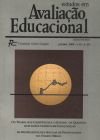As representações sociais de professores do ensino médio
DOI:
https://doi.org/10.18222/eae153020042149Keywords:
Social representations, qualitative research, middle school, content analysisAbstract
Este trabalho tem por objetivo caracterizar as Representações Sociais - RS que professores do Ensino Médio constroem, desenvolvem e elaboram acerca de alguns aspectos relacionados ao Espaço Público, à Gestão Escolar e à Prática Pedagógica. Para tal foram contatados 875 professores que lecionam no Ensino Médio da rede estadual de São Paulo, incluindo o Município, a Grande São Paulo e o interior do Estado. Os professores responderam a um questionário contendo questões “abertas” e “fechadas”. As respostas foram submetidas a uma cuidadosa análise de conteúdo para a identificação de seus significados e sentidos. Entre outros, os resultados indicam uma representação consolidada da escola pública como um espaço de carências nunca supridas. Esta representação, ancorada em vários elementos do que falta ter, do que falta fazer acaba tendo uma função negativa, sempre presente, do não reconhecimento de ações importantes para a melhoria das condições do ensino, consolidando uma visão de contínuo descaso do poder público para com a educação o que repercute em atitudes e comportamentos na escola e na sala de aula.Downloads
Downloads
Published
How to Cite
Issue
Section
License
Authors who publish in this journal agree to the following terms:
a. Authors retain the copyright and grant the journal the right to first publication, with the paper simultaneously licensed under the Creative Commons Attribution license that allows the sharing of the paper with acknowledgment of authorship and initial publication in this journal.
b. Authors are authorized to assume additional contracts separately, for non-exclusive distribution of the version of the paper published in this journal (for example publishing in institutional repository or as a book chapter), with acknowledgment of authorship and initial publication in this journal.
c. Authors are allowed and encouraged to publish and distribute their paper on-line (for example in institutional repositories or on their personal page) at any moment before or during the editorial process, as this can generate productive changes, as well as increase the impact and citation of the published paper (See The Effect of Open Access).





